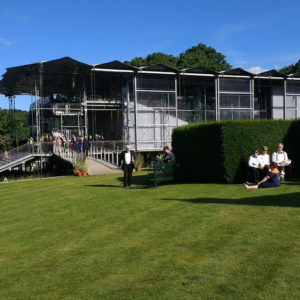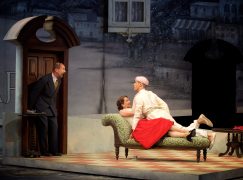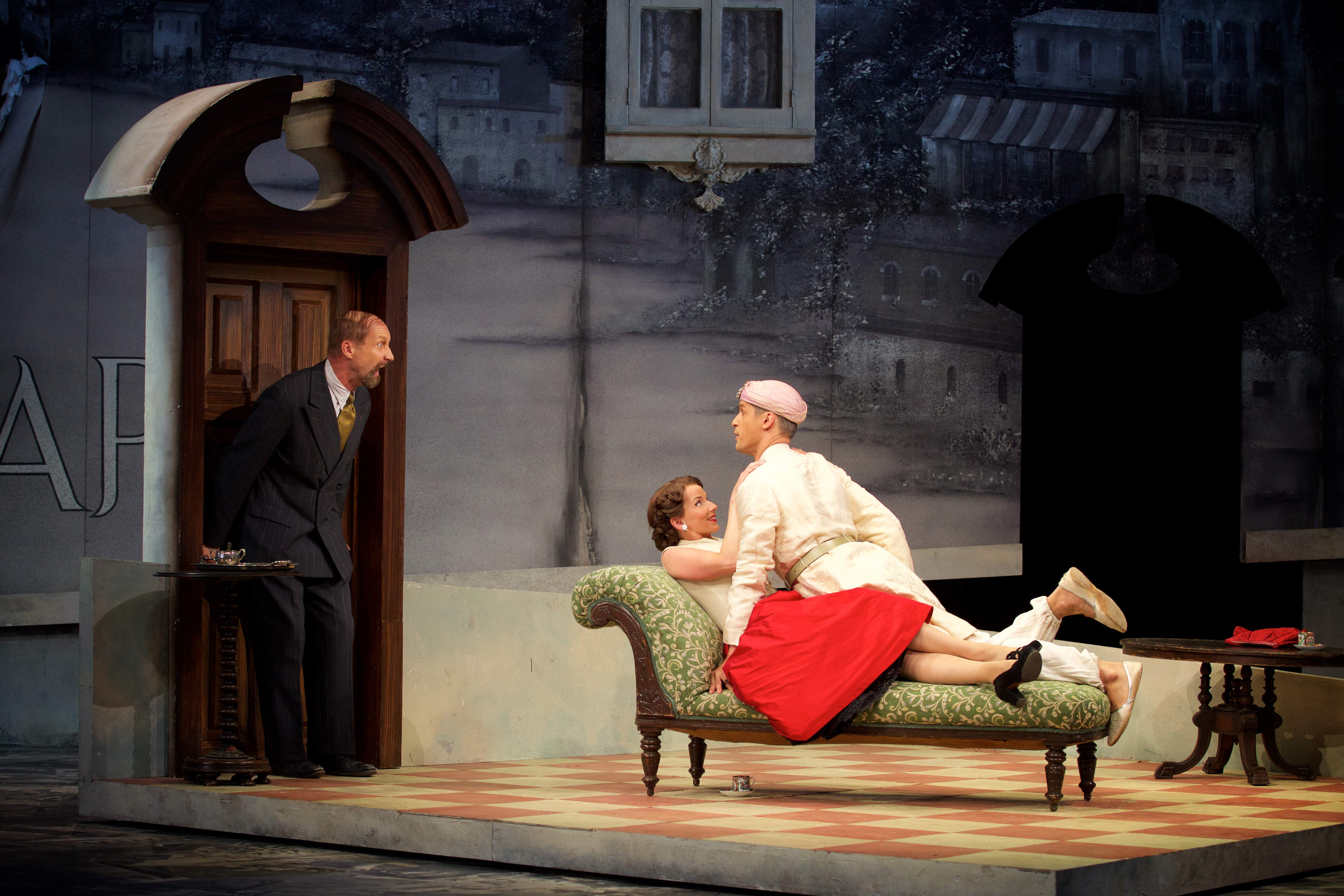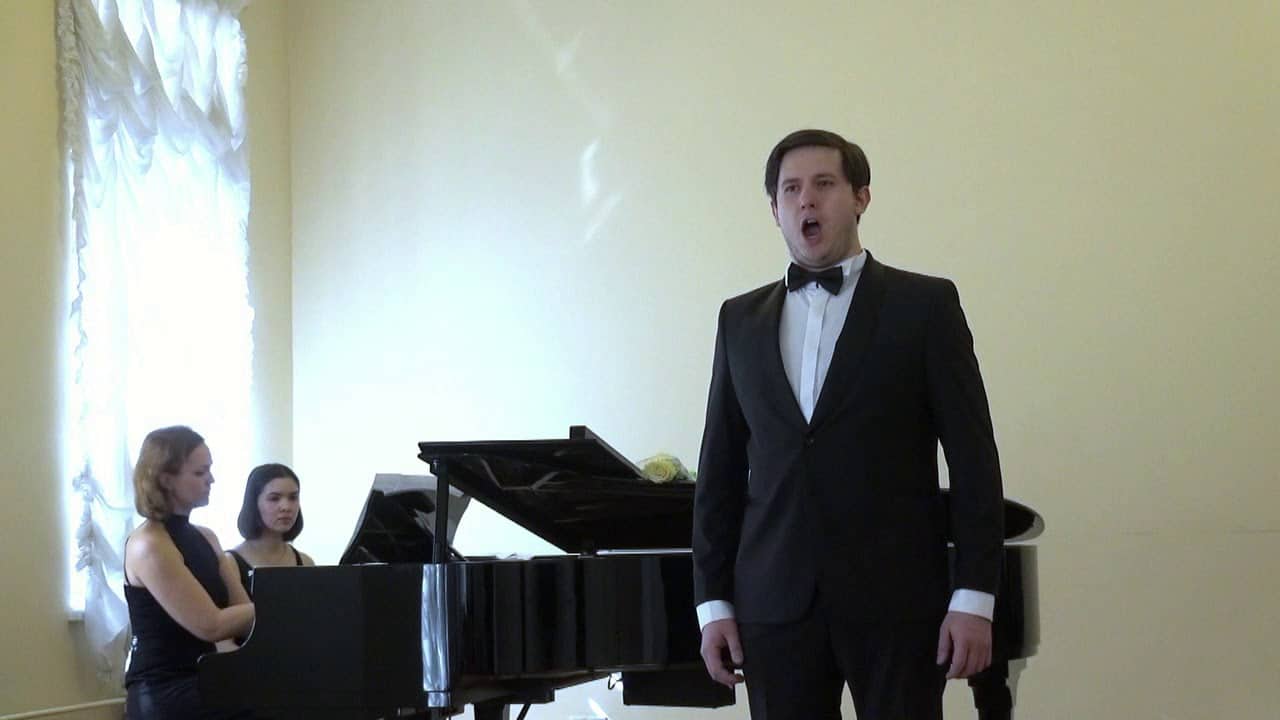English summer opera sells 99 percent
mainGarsington Opera, 50 minutes’ drive from central London, has turned in record attendance figures for this summer. If the season were longer and the pop-up house larger (just 600 seats), it could probably do twice as well.

The performance quality just keep on getting higher. We saw Rossini’s Turco in Italia yesterday – a piece of fluff for a summer’s night, redeemed by quicksilver comic direction (Martin Duncan), pinpoint orchestral playing (conductor: David Parry) and a sex-manic, melting, matchless account of Fiorilla by the inexhaustible Sarah Tynan – so swift about the stage you couldn’t imagine the role sung or played any better.
The laughs came thick and fast. Geoffrey Dolton kept the cuckold role of Geronio just the right side of farce, Quirijn de Lang was a convincing Riviera Turk and if Katie Bray’s Zaida all but disappeared in the second act that was more Rossini’s fault than hers.
Compared to the 1954 Callas recording from La Scala, this was lighter and more musical in every department. The notion that an English country house could match the home of Italian opera in a Rossini repertoire piece might sound absurd, but Callas’s voice was too shrill for Fiorilla, Nicola Rossi-Lemeni was portentous as the Turk, the rest of the cast was variable and the orchestra was decidedly poor. Give me Sarah Tynan at Garsington any summer’s night.

photo: Alice Pennefather/Garsington Opera






Agree wholeheartedly! I don’t think it could be seen and heard better.
Rossini is “easy listening”, they would not dare to do something like Elektra or Birtwistle, which partly explains the bookings. One depressing thing in the 21st century is why no modern works that is ones you would want to hear again more than once are never produced.
The 20th Century has seen an “Academisization” (if I may invent a word) of music. Classical composers now mostly earn a living from having salaried positions in universities or music schools. This has had some dire consequences. Most importantly, it has meant that composers often no longer write music that people want to hear, listen to or buy. As Bernard Shaw perceptively remarked, “Those who can do, those who can’t teach”.
This has made possible the development of two parallel music worlds. On the one hand there is the music that people perform and listen to; composers whose music is popular would include the names such as Bach, Handel, Mozart, Beethoven, Schubert, Chopin, Brahms, Strauss, to mention a few. These were all composers who made a living as musicians (composers, conductors, performers). On the other, there is the world of amateur composers who compose music that is listened to by only a few people (mainly their peers and students) whilst they “teach” composition at university and write books on musicology. Becoming a composer is not about writing a PhD and using the latest “techniques”. It is about writing music that a lot of people find worth listening to. You cannot be a great composer unless you write great music. The ultimate arbiter of music’s value is the public and their perception of music. Beethoven is not a great composer because he was innovative (which of course he was), but because he wrote great music that lots of people want to hear again and again.
Absolute rubbish. There is nothing wrong with somewhere like Garsington pulling in the crowds with Rossini. Plenty of high-quality contemporary opera is produced elsewhere, including at country house venues – see the acclaimed ‘Hamlet’ world premiere at Glyndebourne this year. Also, plenty of contemporary works have had repeat performances in recent years. See ‘Written on Skin’ which made its way from Aix to Paris, Vienna, London (repeatedly); or ‘The Exterminating Angel’ which was premiered at Salzburg and just recently performed in London; or Reimann’s ‘Medea’ which has been brought back for several sold-out series in Vienna and Frankfurt. These are just a few examples, there are dozens if not hundreds more if you can be bothered to look.
Can you not read, it said nothing about Salzburg etc. The point van Clomp was making was that modern classical music is not liked by audiences. A small set up like Garsington would not risk doing something odd like Elektra or your Angel thing. They may do them elsewhere but on the whole modern compositions by academic based composers are not liked compared to say Mozart. Small country opera venues could not afford to risk doing these “tuneless wonder” works. Try to read before engaging your brain next time you ejit.
Van Clomp is right audiences would rather have Rossini than Birtwistle or Turnage or anything remotely modern. Garsington knows this well. Bigger places like Vienna and Salzburg may do the modern stuff, but they can afford a loss with the massive subsidies they get. Pirates of Penzance would be another good one to do at Garsington.
You have got it wrong, van Clomp is on about the fact that modern operas do not attract audiences, Garsington has only 600 seats, if they did the Angel bookings would fall, Rossini is easy listening as van Clomp says, it does not tax the brain cells too much the other ones would cost too much to put on. If as Clomp implies, a composer could compose an opera like G & S it would be booked out. Maybe they might do ALW!
Van Clomp is discussing modern opera with reference to Garsington. Vienna and elsewhere are not relevant here. The point is they would not risk doing an opera like Elektra which might not get full bookings as its only 600 seats capacity. Wise up.
Dear Van Clomp, As well as the Rossini, Garsington 2017 season is presenting new productions of Pelléas et Mélisande, one the greatest and most challenging operas of the 20th century, Handel’s Semele, as well as Mozart’s Marriage of Figaro. We also have 2 world premieres- “The Silver Birch”, a People’s Opera with a professional cast and some 180 children and adults from the local community- by composer Roxanna Panufnik and next season, a main stage world premiere composed by David Sawer- “The Skating Rink” based on the novel by Chilean author Roberto Bolaño. The whole 2017season is 99% sold. Our ethos is simple- to celebrate opera in every form and to aim for the highest excellence possible. I hope we can one day welcome you to Garsington to experience the eclectic, entertaining and challenging work that we perform.
Douglas Boyd | Artistic Director
Garsington Opera at Wormsley
http://www.garsingtonopera.org
http://www.douglasboyd.co.uk
I’m not sure my comment got posted, so I’ll repeat it. In its heyday as popular entertainment, opera offered an experience combining words, drama, music, and visual spectacle that engaged the audience’s emotions in the way we now respond to film and television. Opera has become a niche market, and is often composed either to evoke analytical rather than emotional response, or for an occasion, such as Britten’s ‘Gloriana,’ the Festival of Britain’s dampest squib. By deliberately denying the popular basis of opera, and leaving it to cinema, they shoot themselves in the foot. It’s significant, to me, that the best modern opera I’ve seen recently is ‘The Little Prince’ by Rachel Portman, who is well known for her film music.